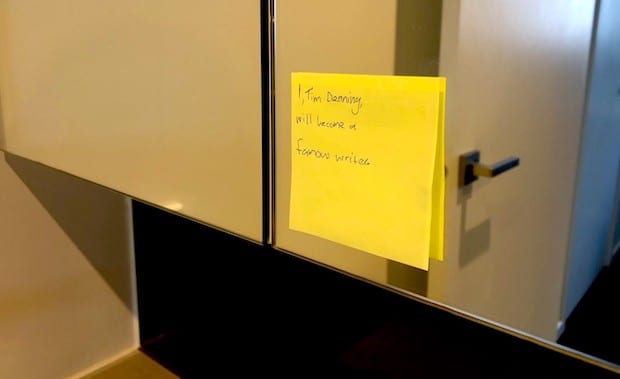Success Advice
How Writing For 1000 Days Straight Made Me A Real Man

Writing was never my thing. I didn’t think of it as an art although in school I was told I was good at it. I never believed this compliment ever.
For more than 1000 days straight I’ve written consistently. While on holiday in San Fran, New Zealand and Japan I wrote. Waiting at the doctor’s office, I wrote. In line at the local vegetarian burger joint, I wrote. The things I’ve learned from writing have changed me from a spoilt little kid, into a real man.
Writing for 1000 days straight taught me:
Writing is my therapy.
My mentor Joel got a bit annoyed at me one day because he saw a few swear words in a blog post I published. I quickly realized what I’d done and then it came to me: I was swearing because it was how I released my frustration.
By writing about the things that upset me, I somehow felt less compelled to be angry at the world.
I found that my problems could be a source of inspiration for others.
You may not believe me but now I actually look forward to having problems.
Problems are what give me the fuel I need to write. Every problem becomes a solution for all of the readers that sit down and absorb my writing. Writing can inspire others and that’s what has helped me become a real man.
A real man, I believe, does things for more than just himself.
It taught me to stop chopping and changing.
I used to be a kid and would always throw in the towel when my passion or hobby got hard. Instead of pushing through the pain I’d just start something new. Writing made me a man by helping me realize that mastery and sticking at it is the real magic trick.
Happiness can be found in the strangest of places.
My dad was a writer and I always thought it was dumb. I never thought I’d ever do it myself. Doing something for more than 1000 days straight teaches you that you can find happiness in places you’d least expect. Try new things, find something that feels cool and stick at it.
It doesn’t have to be a book or blog.
Some days when I’m busy, I count my writing as inspiring emails to fans that can help them. Other days it’s replying to comments that people leave on my social media. We can fall into the trap of believing that writing only happens when it’s in the form of a book or blog post.
Let yourself off the hook. Write whenever you can and stop being so hard on yourself. Writing is writing chief.
Energy will determine the outcome.
I used the following to get more energy:
– On writing days I would sleep more the night before
– I didn’t drink alcohol on days where I planned to write a lot
– I drank mushroom coffee (recommended by Tim Ferriss) for a quick fix
– I ate energy-rich foods like fruits, veggies, and the odd avocado for brain power
“If you’re a sleepy zombie then you’ll never be able to find the energy to keep pushing through all of the hurdles you’re going to encounter with writing or any pursuit for that matter”
The power of a deadline.
Here’s an awesome little hack I used. I’m the biggest procrastinator you’ll ever meet. If I have all day to write, then I’ll spend the last hour before dinner writing if I’m lucky. What I did instead was book in social catch-ups, trips to the cinema’s, outings with the girlfriend and anything I could that involved other people.
This gave me a perceived sense of urgency and a deadline I couldn’t miss. What’s funny is the tighter the deadline, the more productive I became. Here’s what’s even crazier:
The blog posts I’ve written, that had the tightest deadline and the least amount of time to write them, have been my most popular.
Over thinking kills creativity and so does having too much time to fluff around. These deadlines have allowed me to produce lots of writing that have contributed to me becoming a real man.
Writing has uncovered raw emotion in me.
Raw emotion has changed the game for me. As I got past the 10-day mark, I stopped giving a F more and more. This brought out raw emotion in me that couldn’t be faked like an Instagram filter. It’s this raw emotion that got me more readers and allowed me to make a bigger difference in the world.
There’s something about someone who makes the bold decision to wear their heart on their sleeve. Writing heaps forces you to think deeper and to dig deeper every time you sit down at the computer.
Writing for more than 1000 days became like a game to see how much I could learn about myself. The words began to paint a picture of me that I had never seen or even dreamt of.
“These words that became pictures redefined who I was”
I used these pictures to become a new man and one I could be proud of. I want you to discover raw emotion for yourself. I want you to paint beautiful pictures with words that come from deep inside of you.
Just get started.
There were days when I couldn’t be bothered writing. I found that once I got started, the words would pour out of me. It was as if the words were dying to get out of me some days. Instead of giving yourself excuses, don’t try and have every day be the day you produce your best work.
Some of the blog posts I’ve written I thought were barely okay. These same posts have been highly shareable more than my so-called serious stuff. 1000 days of writing teaches you to disconnect yourself from the outcome and focus on the practice itself. Discipline has made me a real man.
You must like the topic.
I tried writing about stuff that people told me too. I found myself hating the process every time. Have a list of suggested topics that you’ve come up with and then write about the one that makes you feel good at the time.
Make it up as you go.
I invent words all the time like self-disrupt, fakepreneur and too many other ridiculous ones to mention here. I break grammar rules to suit myself and to make my writing easy on the eye. What will separate you from everyone else is when you decide to make up the rules.
It’s easier to be different than it is to be a better writer, or saxophone player or artist. A rule forces you to conform to everyone else’s expectations. What made me a real man was discovering the power of my own creativity and not listening to all the hype out there.
There’s a lot of noise and people that will tell you they have the secret chicken sauce. They’re selling lies to you to benefit their own selfish goals.
Be you and make up the rest as you go.
Reading fuels your creative brain.
I get asked all the time “Tim, where do you get all these writing ideas from?”
I wish I could tell you that I was some idea factory that could mass-produce amazing writing pieces. The truth is I’m not that smart. In conjunction with writing, I’ve also been reading like a KFC junkie addicted to hot sauce.
Books have opened up my world to what’s possible. Books have helped me see things in my life that I had previously ignored.
“Books sold me a truth that I couldn’t get from the Internet or TV”
Every word you read get’s stored in your computer brain and can be recalled later on without you probably even realizing. Reading has taught me the lessons that have made me a man and a blogger.
Authenticity and transparency, plus brutal honesty, is where it’s at.
In the beginning, I was a bit of a pussy. I hid parts of myself and didn’t tell the full story. In the first 10 days, I tried to be brutal. By the 1000th day, I had enough practice and had seen the audience react enough, that I showed everything in my stories. No detail was left out.
People read my stuff because they know it’s authentic and real. I’m brutally honest and not afraid to make fun of myself. I’m not afraid to admit that I too have once been a self-obsessed, immature, coward too. It’s okay; we’ve all been there.
This brutal honesty helps you be honest with yourself too. Through these honest moments, you learn a lot about who you are and who you can become. I think real honesty helped me become a real man. A man I can be proud of.
If you want to increase your productivity and learn some more valuable life hacks, then join my private mailing list on timdenning.net
Business
The Simple Security Stack Every Online Business Needs
Most small businesses are exposed online without realising it. This simple protection stack keeps costs low and risks lower.

Running a business online brings speed and reach, but it also brings risk. Data moves fast. Payments travel across borders. Teams log in from homes, cafés, and airports. (more…)
Business
If Your Business Internet Keeps Letting You Down, Read This
From smoother operations to better security, dedicated internet access is quietly powering today’s high-performing businesses.

Today, a dependable internet service is the bedrock for uninterrupted business operations. Many organizations rely on stable online connections for communication, data transfer, and customer interaction. (more…)
Did You Know
How Skilled Migrants Are Building Successful Careers After Moving Countries
Behind every successful skilled migrant career is a mix of resilience, strategy, and navigating systems built for locals.

Moving to a new country for work is exciting, but it can also be unnerving. Skilled migrants leave behind familiar systems, networks, and support to pursue better job opportunities and a better future for their families. (more…)
-

 News2 weeks ago
News2 weeks agoBrandon Willington Builds 7-Figure Business by Ignoring Almost Everything
-

 Health & Fitness2 weeks ago
Health & Fitness2 weeks agoWhat Minimalism Actually Means for Your Wellness Choices
-

 Did You Know2 weeks ago
Did You Know2 weeks agoWhy Most Online Courses Fail and How to Fix Them
-

 Business2 weeks ago
Business2 weeks agoIf Your Business Internet Keeps Letting You Down, Read This
-

 Business4 days ago
Business4 days agoEntrepreneur’s Guide to Pay Stubs: Why Freelancers and Small Business Owners Need a Smart Generator
-

 Business2 days ago
Business2 days agoThe Simple Security Stack Every Online Business Needs
-

 Finances2 days ago
Finances2 days agoWhy Financial Stress Is One of the Biggest Barriers to Personal Growth
-

 Scale Your Business2 days ago
Scale Your Business2 days ago5 Real Ways to Grow Your User Base Fast





















2 Comments